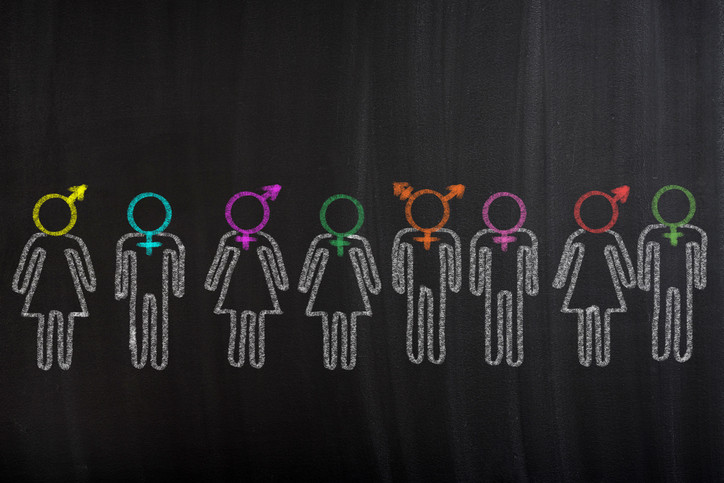Misgendering: What it is and why it matters

As a cisgender woman with long hair and a closet full of dresses, I can count on one hand the number of times I've been misgendered by being called "he" or "sir." Cisgender means I was assigned female at birth and identify as a woman. For people who are transgender and/or nonbinary (TNB), with a different gender identity than their assigned sex at birth, being misgendered may be a daily occurrence.
Why does misgendering matter?
Imagine a scenario in which you are called the wrong pronoun or honorific — for example Mr., Ms., or Mrs. — multiple times a day. It might happen in person, over the phone, or via email. Each time it happens, you must decide whether it is worth it to correct that person or easier to let it go. Imagine that you are repeatedly confronted with this experience and the decision of whether or not to correct it throughout the day — every day. As we know from research, and as I've also heard from the TNB people I know, this is both exhausting and demoralizing. When people are misgendered, they feel invalidated and unseen. When this happens daily, it becomes a burden that can negatively impact their mental health and their ability to function in the world.
If you are a cisgender person, you can lighten this burden for TNB people by using the right names, pronouns, and honorifics to refer to them, apologizing when you misgender someone, and correcting other people when they misgender someone.
How do you use the correct name, pronouns, and honorifics?
It's simple: follow the person's lead, or ask them. The name, pronouns, and honorifics that a person chooses to use for themselves communicate to others how they want to be seen and acknowledged. Using the correct terms for someone is a sign of respect and recognition that you see them as they see themselves.
If you knew someone previously as one gender and now they use a different name, pronouns, or honorifics, it can be hard to remember to use the right terms, especially if the person is gender-fluid and changes their pronouns more often. It can also be challenging to adjust to using gender-neutral pronouns like they and them, neopronouns like ze and zir, and unfamiliar honorifics, such as Mx (pronounced "mix"). But using the right terms is critically important for supporting and respecting TNB people.
A few tips and tools
- Try not to make assumptions about a person's name, pronouns, or honorifics based on how they look. The only way to know for sure what terms a person uses is to ask them in private ("What pronouns do you use?"). Asking someone in front of other people may unintentionally put them on the spot to disclose their identity to new people. You can ask anyone — cisgender or TNB — their name, pronouns, or honorifics.
- Once you know what terms a person uses, the best way to make sure that you use the correct ones is to practice (this tool can help). Practice when they are in the room and when they are not in the room. Practice before you know you will see someone. Practice with others in your life: your cisgender friends, your spouse, your pet, your child. In our household, my wife and I try to use gender-neutral pronouns to refer to our preschooler's toys and dolls so that we can practice using them ourselves. We even change the pronouns of characters in books that we read as another way to practice.
- Another tip for remembering to use the correct name, pronouns, and honorifics is to pause before you speak. When we are stressed or busy, we are more likely to misgender people. Try to pause for a beat before you speak to make sure you are using the right terms to refer to someone. Similarly, reread emails before you send them to make sure you are not misgendering someone.
- Be patient as you learn to use new terms and pronouns. It gets easier with practice and may become second nature over time.
How to apologize for misgendering someone
Misgendering will happen. What's most important is how you handle it when it does. The best way to handle misgendering someone who is present is to apologize and try harder next time ("I'm sorry, I meant [correct name/pronoun/honorific]"). Keep your apology brief so that it doesn't become about you and your mistake.
If you are corrected by someone else, try not to be defensive. Instead, simply respond with a thank you and a correction ("Oh, thank you — I'll email [correct name/pronoun] about that"). This is an important step, even if the misgendered person is not present, so you can practice and so others can learn from your example. Any time you misgender someone, practice so you can do better next time.
How to correct misgendering when you hear or see it
As a cisgender colleague and supervisor to numerous TNB people, many of whom are nonbinary and use they/them pronouns, I often find myself in situations where I need to correct misgendering. I might say something like "I noticed you used she to refer to that person. Just to let you know, they use they/them pronouns." Or I might write a note in a Zoom chat or in an email, "Just a friendly reminder that this person uses they/them pronouns." Stepping forward this way lessens the burden of correcting misgendering for TNB people. It also models to others that a correction can be done in a friendly way, and is important for respecting and including TNB people.
How to use gender-neutral language and normalize pronouns
One way to avoid misgendering is to use gender neutral language. Here are some examples:
- Instead of "boys and girls" or "ladies and gentlemen," say "everyone."
- Instead of "fireman" or "policeman," say "firefighter" or "police officer."
- Instead of "hey guys," say "hey everyone" or "hey all."
Try to pay attention to your language and find ways to switch to gender-neutral terms.
You can be mindful of your own pronouns and help other people be mindful by normalizing displays of pronouns. Here are some ways that I make my own pronouns (she/her) visible to others:
- I list my pronouns in my email signature, in my Zoom name, and on the title page of presentations.
- I wear a pronoun pin at work.
- I introduce myself with my pronouns.
These actions signal to others that I am thinking about pronouns, and am aware that people may use different pronouns than might be expected from their appearance.
You may still make mistakes, but it's important to keep practicing and trying to use the right terms! By using the correct names, pronouns, and honorifics to refer to people, apologizing when you misgender someone, and correcting other people when they misgender, you can support and respect the TNB people around you. This helps create a more inclusive world for everyone.
About the Author

Sabra L. Katz-Wise, PhD, Contributor
Disclaimer:
As a service to our readers, Harvard Health Publishing provides access to our library of archived content. Please note the date of last review or update on all articles.
No content on this site, regardless of date, should ever be used as a substitute for direct medical advice from your doctor or other qualified clinician.















